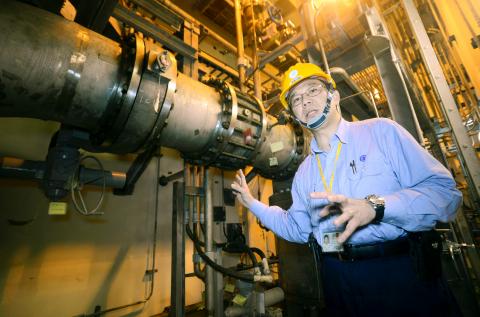The raging controversy over the fate of the Fourth Nuclear Power Plant in New Taipei City’s (新北市) Gongliao District (貢寮) has sparked public concerns over nuclear waste disposal, but Taiwan Power Co (Taipower) said on Monday that it would do its best to deal with the final management of nuclear waste.
New Taipei City Mayor Eric Chu (朱立倫) said the disposal of nuclear waste is a headache, because the city currently has problems dealing with the waste that has already been created.
“If Taiwan cannot deal with the problem of disposing nuclear waste, how can the country use nuclear energy? If nuclear waste continues being stockpiled in the city, would it be acceptable to local residents?” Chu asked.

Photo: Sam Yeh, AFP
Chai Fu-feng (蔡富豐), a Taipower spokesman, said that low-level radioactive waste has not only been produced by nuclear power plants, but also by medical and related research institutes.
He said that while the schedule for selecting sites for the disposal of nuclear waste has been postponed, Taipower would strive to seek a breakthrough in the matter.
Meanwhile, the Atomic Energy Council (AEC) has asked Taipower to complete the selection of sites for nuclear disposal facilities by 2016 and to complete construction of the facilities by 2021. Otherwise, the AEC would not rule out taking proper control measures, including ordering a halt to operations at nuclear power plants.
AEC Deputy Minister Chou Yuan-ching (周源卿) said the council is duty-bound to ensure nuclear safety.
Equipment and facilities in Taiwan’s nuclear power plants were largely imported from the US, and the AEC has formulated regulations governing the establishment of nuclear power facilities, nuclear refueling and granting of operating licenses based on international standards and rules, Chou said.
After Japan’s Fukushima Dai-ichi nuclear disaster in 2011, the AEC stepped up inspections of nuclear power plants by sending two specialists to carry out safety checks every two weeks, Chou added.
The Ministry of Economic Affairs has chosen Wuciou Island (烏坵) in Kinmen County and Daren Township (達仁) in Taitung County as possible sites for storage facilities for low-level radioactive waste. The ministry plans to carry out an environmental assessment and to hold local referendums to decide on a suitable site.
Over the past few years, the AEC has leveled fines ranging from NT$100,000 (US$3,370) to NT$1 million on Taipower for violating guidelines on how nuclear waste should be stored.

Chinese Nationalist Party (KMT) Chairman Eric Chu (朱立倫), spokeswoman Yang Chih-yu (楊智伃) and Legislator Hsieh Lung-chieh (謝龍介) would be summoned by police for questioning for leading an illegal assembly on Thursday evening last week, Minister of the Interior Liu Shyh-fang (劉世芳) said today. The three KMT officials led an assembly outside the Taipei City Prosecutors’ Office, a restricted area where public assembly is not allowed, protesting the questioning of several KMT staff and searches of KMT headquarters and offices in a recall petition forgery case. Chu, Yang and Hsieh are all suspected of contravening the Assembly and Parade Act (集會遊行法) by holding

PRAISE: Japanese visitor Takashi Kubota said the Taiwanese temple architecture images showcased in the AI Art Gallery were the most impressive displays he saw Taiwan does not have an official pavilion at the World Expo in Osaka, Japan, because of its diplomatic predicament, but the government-backed Tech World pavilion is drawing interest with its unique recreations of works by Taiwanese artists. The pavilion features an artificial intelligence (AI)-based art gallery showcasing works of famous Taiwanese artists from the Japanese colonial period using innovative technologies. Among its main simulated displays are Eastern gouache paintings by Chen Chin (陳進), Lin Yu-shan (林玉山) and Kuo Hsueh-hu (郭雪湖), who were the three young Taiwanese painters selected for the East Asian Painting exhibition in 1927. Gouache is a water-based

Taiwan would welcome the return of Honduras as a diplomatic ally if its next president decides to make such a move, Minister of Foreign Affairs Lin Chia-lung (林佳龍) said yesterday. “Of course, we would welcome Honduras if they want to restore diplomatic ties with Taiwan after their elections,” Lin said at a meeting of the legislature’s Foreign Affairs and National Defense Committee, when asked to comment on statements made by two of the three Honduran presidential candidates during the presidential campaign in the Central American country. Taiwan is paying close attention to the region as a whole in the wake of a

OFF-TARGET: More than 30,000 participants were expected to take part in the Games next month, but only 6,550 foreign and 19,400 Taiwanese athletes have registered Taipei city councilors yesterday blasted the organizers of next month’s World Masters Games over sudden timetable and venue changes, which they said have caused thousands of participants to back out of the international sporting event, among other organizational issues. They also cited visa delays and political interference by China as reasons many foreign athletes are requesting refunds for the event, to be held from May 17 to 30. Jointly organized by the Taipei and New Taipei City governments, the games have been rocked by numerous controversies since preparations began in 2020. Taipei City Councilor Lin Yen-feng (林延鳳) said yesterday that new measures by